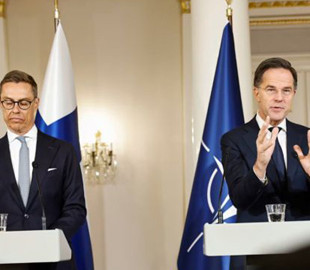
In response to a series of sabotage attacks in the Baltic Sea, NATO is launching the Baltic Sentry mission to protect underwater infrastructure. The mission will involve additional frigates, patrol aircraft and drones. This was announced by NATO Secretary General Mark Rutte at a meeting of the leaders of the eight Baltic member states of the Alliance in Helsinki.
Finland, Estonia, Denmark, Germany, Latvia, Lithuania, Poland and Sweden are ready to respond decisively to attacks on underwater facilities, a joint statement said following the summit in Helsinki on January 14. The countries welcome the deployment of additional forces within the framework of NATO's operation “Baltic Sentinel”.
“We remain ready to act individually and collectively to protect our critical underwater infrastructure and build resilience, including by building and expanding existing cooperation between NATO and the EU. We welcome additional measures taken by Allies and partners to strengthen security in our region, which reinforce NATO's existing and planned response,” the joint statement said. NATO Secretary General Mark Rutte, in his address to the meeting, stressed that potential threats to maritime infrastructure would have consequences, including possible boarding, seizure and arrest of the vessel.Protecting our infrastructure is extremely important. Not only for power supply, which is carried out via power cables or pipelines. But also to ensure the security of more than 95% of Internet traffic via underwater cables. And 1.3 million km of cables provide daily financial transactions worth about 10 trillion dollars”, — Rütte emphasized.
According to German Chancellor Olaf Scholz, NATO members are considering the possibility of introducing sanctions against Russia's shadow fleet in the area. Within the framework of efforts to protect critically important underwater objects.
“We will continue to take action against the Russian shadow fleet. In particular, both within the framework of the sanctions already in place and those that may follow, including sanctions against specific vessels and shipping companies that pose a threat to the environment”, — Scholz said.
Every day, about 2,000 ships cross the Baltic Sea. ships, so it is difficult to keep track of them all.
“Let us recognize that we cannot rule out the recurrence of such attacks. That is why we are discussing what the appropriate response and coordination should be in terms of legal, military and information exchange. We also call on private companies to take a more active role in protecting infrastructure“, — commented Latvian President Edgars Rinkēvičs.
Finnish leader Alexander Stubb called on Europe to increase military spending and improve defense coordination amid hybrid threats from Russia, in particular related to damage to submarine cables in the Baltic Sea.
“The main thing is to try to study the situation so that this does not happen near critical infrastructure. This is what we have found out here and drawn conclusions together with our allies“, — Stubb noted following the meeting of the leaders of the Baltic NATO countries.

